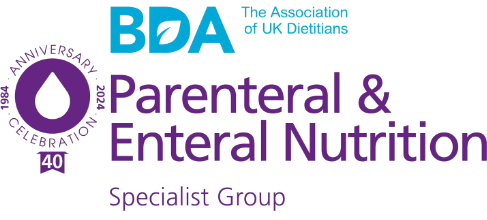Dietetic Outcomes Toolkit
A lot has happened in outcomes since the Dietetic Outcomes Toolkit (also referred to as 'DOT') was first published. The latest version has been updated in line with the BDA outcome documents. All the case studies have been updated, giving examples of choosing outcomes, outcome indicators and setting goals. There continues to be a wide variety of tools included in the 'DOT' which you can use to measure outcomes.We would value hearing about your experiences of using the 'DOT' so please do keep in touch peng@bda.uk.com
PENG Launched the Dietetic Outcomes Toolkit in 2016
The British Dietetic Association's Parenteral and Enteral Nutrition Group (PENG) launched a Dietetic Outcomes Toolkit (DOT) to provide dietitians with a variety of approaches for measuring outcomes in dietetic care, with a particular focus on those relevant to nutrition support (oral, enteral and parenteral).
“In this era of accountability in medicine, information regarding healthcare outcomes plays a pivotal role in medical decision-making” says Anne Holdoway, Consultant Dietitian, Chair of the Malnutrition Pathway Consensus Panel. “Measuring dietetic outcomes and interpreting and sharing the information is essential. Although the field of outcomes assessment has not fully matured, a range of tools and methods are emerging that enable us to demonstrate the value of dietetic services to commissioners and the wider health community.’
“This toolkit will provide dietitians with a variety of approaches for addressing the challenge of measuring outcomes in nutritional care with a particular focus on those outcomes relevant to nutrition support. Ultimately within PENG we want to strengthen the evidence-base for interventions and dietetic practice, enhance patient care and demonstrate the ‘added-value’ that the profession provides across the breadth of nutrition support.”
“Our vision in starting this project was to provide a practical toolkit to collectively capture the tools available and develop new tools to help dietitians embed outcome data collection in their practice” says Sean White, Home Enteral Feed Dietitian, Sheffield Teaching Hospitals NHS Foundation Trust and PENG Clinical Lead Home Enteral Tube Feeding (HETF). “We also wanted to facilitate the reporting of outcomes in a meaningful way, not only to us as professionals, but also for our end users and those who commission our services.”
The toolkit contains examples of the different tools currently available and can be used by dietitians in a variety of conditions, with case studies to illustrate on a practical level how each one can be used. Use of a particular tool will depend on the patient diagnosis and the agreed goals for intervention. To allow for the cross fertilisation of ideas, tools that are not specific to nutrition support have also been included.
The PENG working group would like to thank all PENG members and NHS Trusts who helped in the development of this toolkit and encourage dietitians across the country to share further tools and their feedback with them.
DOT includes:
- A list of nutrition support measures and relevant outcome tools that can be used
- A list of potential barriers to achieving outcomes – which will assist when outcomes are not met
- Examples of outcomes tools including:
- Patient Reported Experience Measures (PREMs)
- Patient Reported Outcome Measures (PROMs)
- Therapy Outcome Measures (TOMs)
- Goal Attainment Scale (GAS)
- Case histories relating to some of the tools including information on reporting
- Examples of assessment forms
A free downloadable copy of the PENG Outcomes Toolkit can be downloaded here
Note to Editors
The Parenteral and Enteral Nutrition Group (PENG) is a specialist group of the British Dietetic Association. The PENG strives to train, educate, support and represent dietitians working in oral, enteral and parenteral nutrition support in all care settings. The group acts as the professional voice on matters pertaining to nutritional support and is a founder group of BAPEN.
Members are registered Dietitians who aim to ensure that nutritional support for patients is safe and clinically effective both in hospital and at home.
Read more information about PENG on this site or email: communications.peng@bda.uk.com
For further information on the Dietetic Outcomes Toolkit (DOT) please contact:
Hilary Franklin
Hilary Franklin Healthcare Communications
Email: hilary@franklincoms.co.uk
Tel: 020 8398 8551
Mobile: 07958 607898

